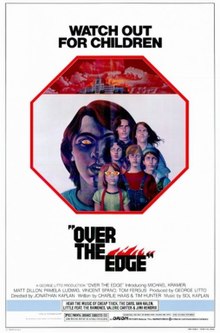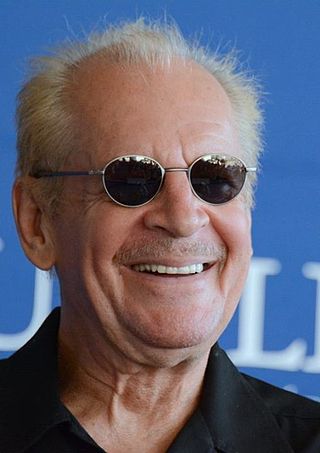
Lawrence Donald Clark is an American film director, photographer, writer and film producer who is best known for his controversial teen film Kids (1995) and his photography book Tulsa (1971). His work focuses primarily on youth who casually engage in illegal drug use, underage sex, and violence, and who are part of a specific subculture, such as surfing, punk rock, or skateboarding.

Matthew Raymond Dillon is an American actor. He has received various accolades, including an Academy Award nomination and Grammy nomination.
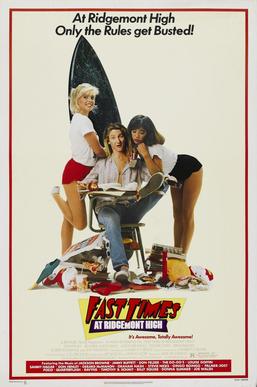
Fast Times at Ridgemont High is a 1982 American coming-of-age comedy film directed by Amy Heckerling from a screenplay by Cameron Crowe, based on his 1981 book Fast Times at Ridgemont High: A True Story, and starring Sean Penn, Jennifer Jason Leigh, Judge Reinhold, Phoebe Cates, Brian Backer, Robert Romanus, and Ray Walston. Crowe went undercover at Clairemont High School in San Diego and wrote about his experiences.

School Ties is a 1992 American drama film directed by Robert Mandel and starring Brendan Fraser, Matt Damon, Chris O'Donnell, Randall Batinkoff, Andrew Lowery, Cole Hauser, Ben Affleck, and Anthony Rapp. Fraser plays the lead role as David Greene, a Jewish high school student who is awarded an athletic scholarship to an elite preparatory school in his senior year.
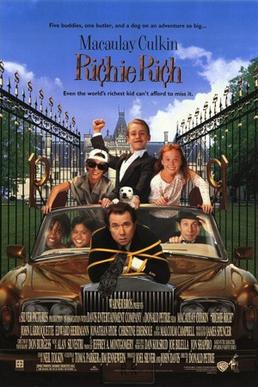
Richie Rich is a 1994 American comedy film directed by Donald Petrie and based on the comic character of the same name created by Alfred Harvey and Warren Kremer. The film was distributed by Warner Bros. under their Warner Bros. Family Entertainment label. The film stars Macaulay Culkin, John Larroquette, Edward Herrmann, Jonathan Hyde, and Christine Ebersole, while Reggie Jackson, Claudia Schiffer, and Ben Stein appear in cameo roles. Culkin's younger brother, Rory Culkin, played the part of Young Richie Rich. In theaters, the film was shown with a Wile E. Coyote and the Road Runner cartoon called Chariots of Fur, and was followed by the 1998 direct-to-video sequel Richie Rich's Christmas Wish.
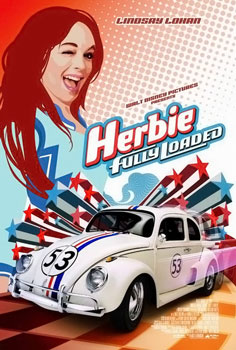
Herbie: Fully Loaded is a 2005 American sports comedy film directed by Angela Robinson from a screenplay by Thomas Lennon, Robert Ben Garant, and Smallville developers Alfred Gough and Miles Millar. The film is the sixth and final installment in the Herbie film series, following the television film The Love Bug (1997), and the first theatrical film since Herbie Goes Bananas (1980). It serves as a direct sequel to the previous films. The film stars Lindsay Lohan, Justin Long, Breckin Meyer, Matt Dillon, and Michael Keaton. It features cameos by many NASCAR drivers, including Jeff Gordon, Jimmie Johnson, Tony Stewart, and Dale Jarrett.

Varsity Blues is a 1999 American coming-of-age sports comedy-drama film directed by Brian Robbins that follows a small-town high school football team through a tumultuous season, in which the players must deal with the pressures of adolescence and their football-obsessed community while having their overbearing coach constantly on their back. In the small fictional town of West Canaan, Texas, football is a way of life and losing is not an option. The film drew a domestic box office gross of $52 million against its estimated $16 million budget despite mixed critical reviews. The film has since gone on to become a cult film.

Cerina Vincent is an American actress. She had her breakthrough role starring as Maya in the television series Power Rangers Lost Galaxy, followed by a part in the comedy film Not Another Teen Movie, before going on to star in the horror film Cabin Fever, which established her as a "scream queen" and led to further roles in horror movies. More recently, she appeared as Suzy Diaz in the Disney Channel series Stuck in the Middle. She has also written three books with Jodi Lipper, wrote a regular column for The Huffington Post, and co-hosts the podcast Raising Amazing with Dr. Joel Gator.

The Adventures of Ford Fairlane is a 1990 American action comedy film noir mystery film directed by Renny Harlin and written by David Arnott, James Cappe, and Daniel Waters based on a story by Arnott and Cappe. The film stars comedian Andrew Dice Clay as the title character, Ford Fairlane, a "Rock n' Roll Detective", whose beat is the music industry in Los Angeles. True to his name, Ford drives a 1957 Ford Fairlane 500 Skyliner in the film.
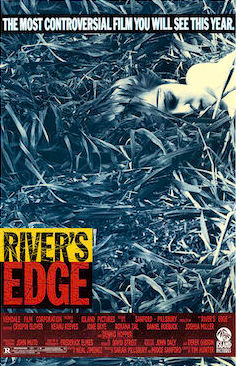
River's Edge is a 1986 American crime drama film directed by Tim Hunter, written by Neal Jimenez, and starring Crispin Glover, Keanu Reeves, Ione Skye Leitch in her film debut, Daniel Roebuck and Dennis Hopper. It follows a group of teenagers in a Northern California town who are forced to deal with their friend's murder of his girlfriend and the subsequent disposal of her body. Jimenez partially based the script on the 1981 murder of Marcy Renee Conrad in Milpitas, California.

You, Me and Dupree is a 2006 American romantic comedy film directed by Anthony Russo and Joe Russo and written by Mike LeSieur. It stars Owen Wilson, Kate Hudson, Matt Dillon, Seth Rogen, Amanda Detmer, Todd Stashwick, and Michael Douglas.
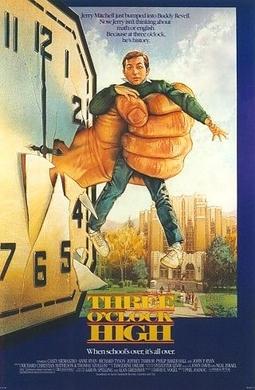
Three O'Clock High is a 1987 American teen comedy film directed by Phil Joanou. The script, about a meek high schooler who is forced into a fight with an unstable new transfer student, is based on the high school experiences of screenwriters Richard Christian Matheson and Thomas Szollosi. It was shot in Ogden, Utah.
Who Killed Bambi? was to be the first film featuring the punk rock band the Sex Pistols, and was due to be released in 1978. Russ Meyer and then Jonathan Kaplan were due to direct from a script by Roger Ebert and Pistols' manager Malcolm McLaren.
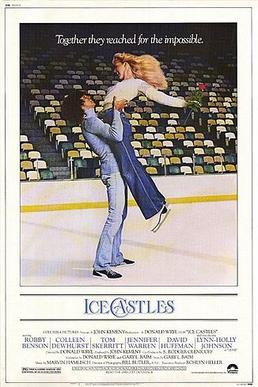
Ice Castles is a 1978 American romantic drama film directed by Donald Wrye and starring Lynn-Holly Johnson and Robby Benson. It is the story of Lexie Winston, a young figure skater, and her rise and fall from super stardom. Tragedy strikes when, following a freak accident, Lexie loses her sight, leaving her to hide away in the privacy of her own despair. She eventually perseveres and begins competing in figure skating again.
Jonathan Kaplan is an American film producer and director. His film The Accused (1988) earned actress Jodie Foster the Oscar for Best Actress and was nominated for the Golden Bear at the 39th Berlin International Film Festival. His film Love Field (1992) earned actress Michelle Pfeiffer an Oscar nomination for Best Actress and was nominated for the Golden Bear at the 43rd Berlin International Film Festival. Kaplan received five Emmy nominations for his roles directing and producing the television series ER.
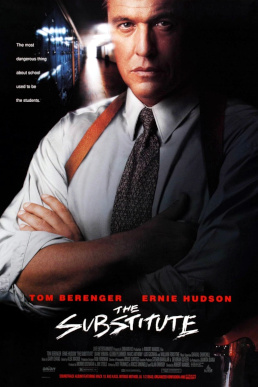
The Substitute is a 1996 American action thriller film directed by Robert Mandel and starring Tom Berenger, Ernie Hudson, Marc Anthony, William Forsythe, Raymond Cruz and Luis Guzmán. It was filmed at Miami Senior High School.
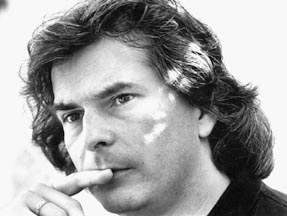
Jean-Claude Lauzon was a Canadian filmmaker and screenwriter. Born to a working class family in Montreal, Quebec, Lauzon dropped out of high school and worked various jobs before studying film at the Université du Québec à Montréal. His two feature-length films, Night Zoo (1987) and Léolo (1992), established him as one of the most important Canadian directors of his generation. American film critic Roger Ebert wrote that "Lauzon is so motivated by his resentments and desires that everything he creates is pressed into the cause and filled with passion."
Jane Bernstein is an American writer and novelist.
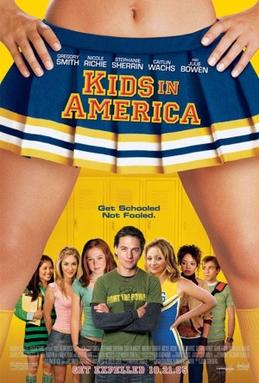
Kids in America is a 2005 American comedy film written and directed by Josh Stolberg. The film is inspired by real events.

Siegfried & Roy: The Magic Box is a 1999 American biographical film about magicians Siegfried & Roy directed by Brett Leonard and starring Siegfried & Roy as themselves with narration by Anthony Hopkins.
